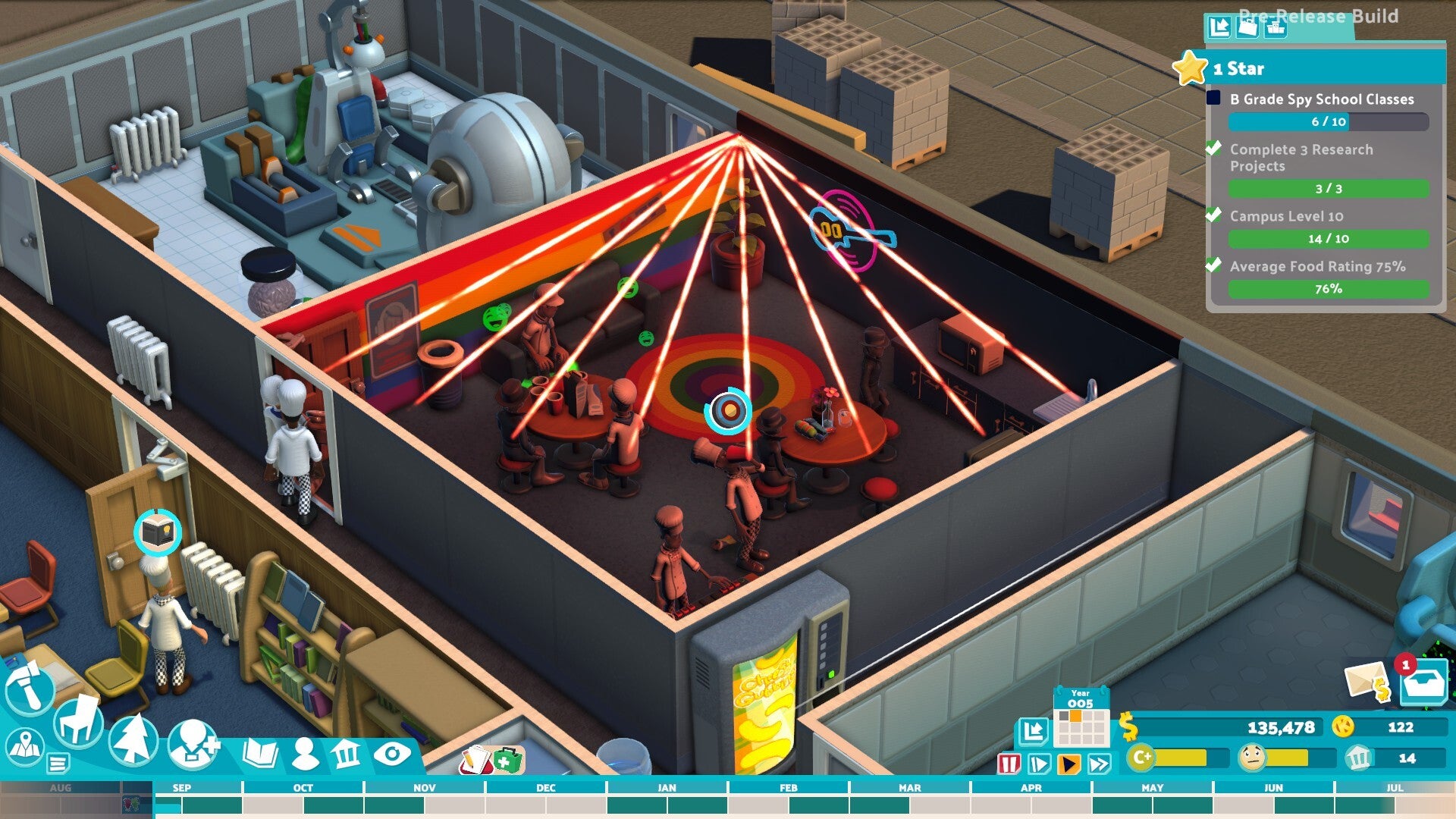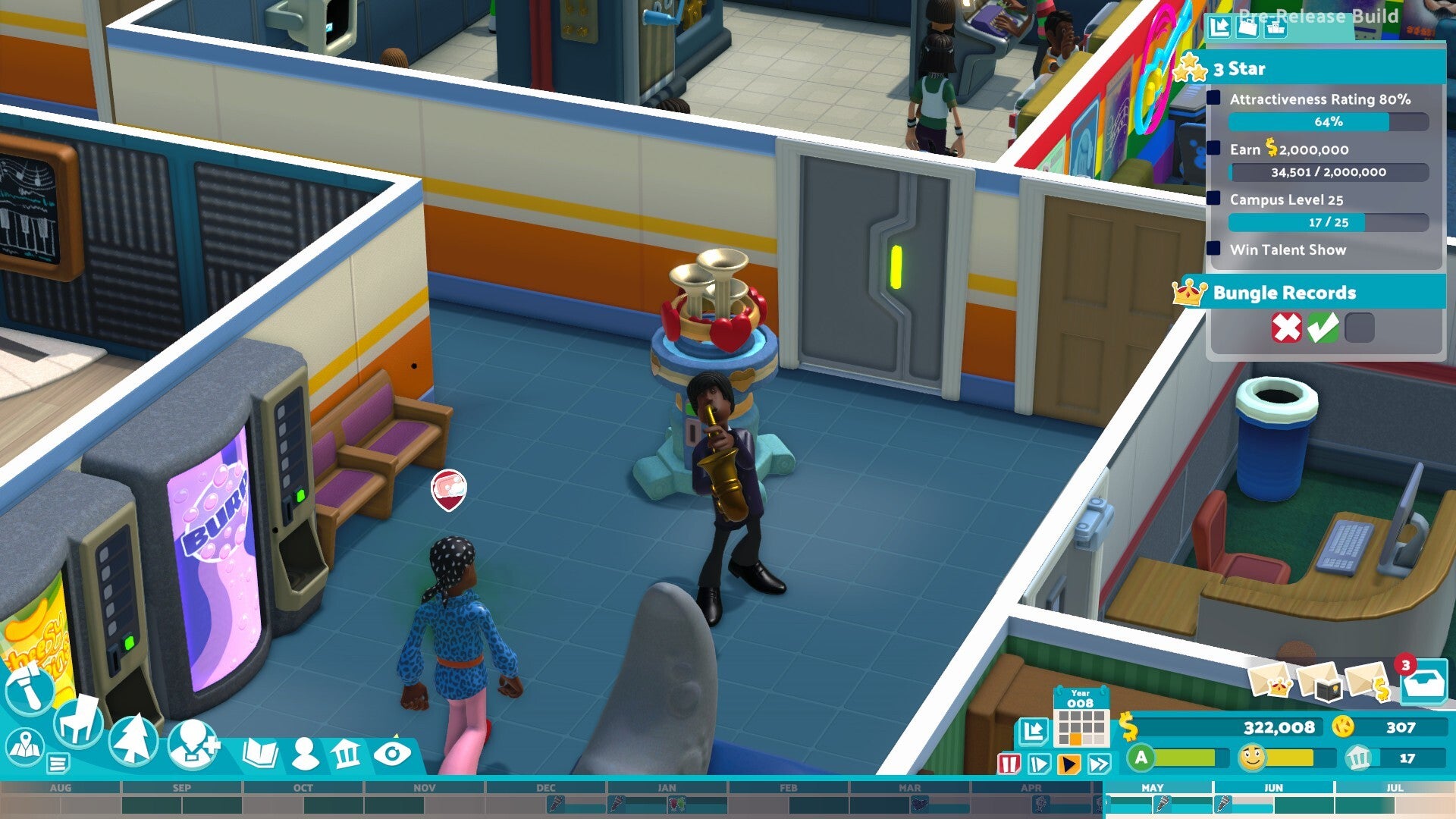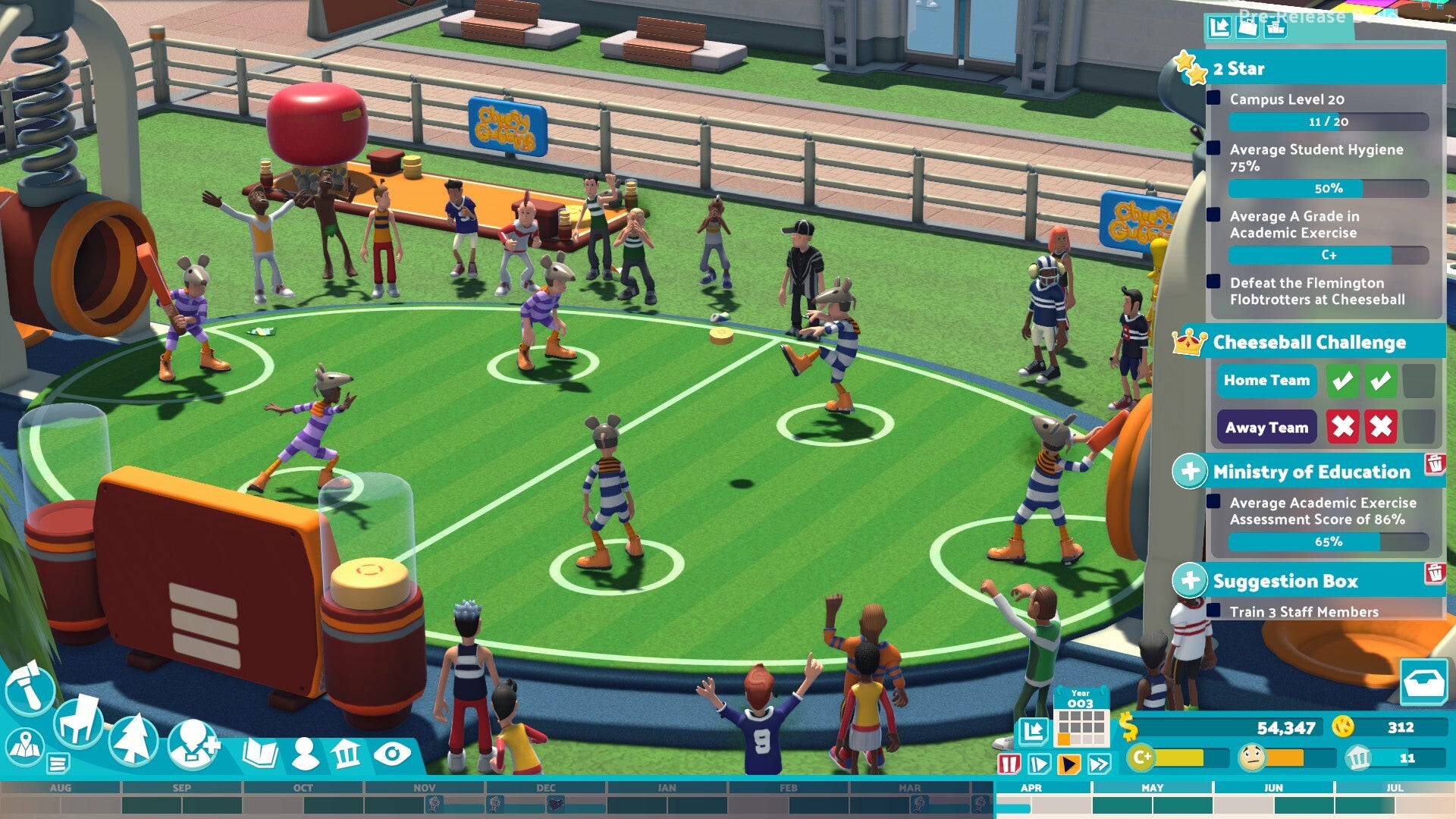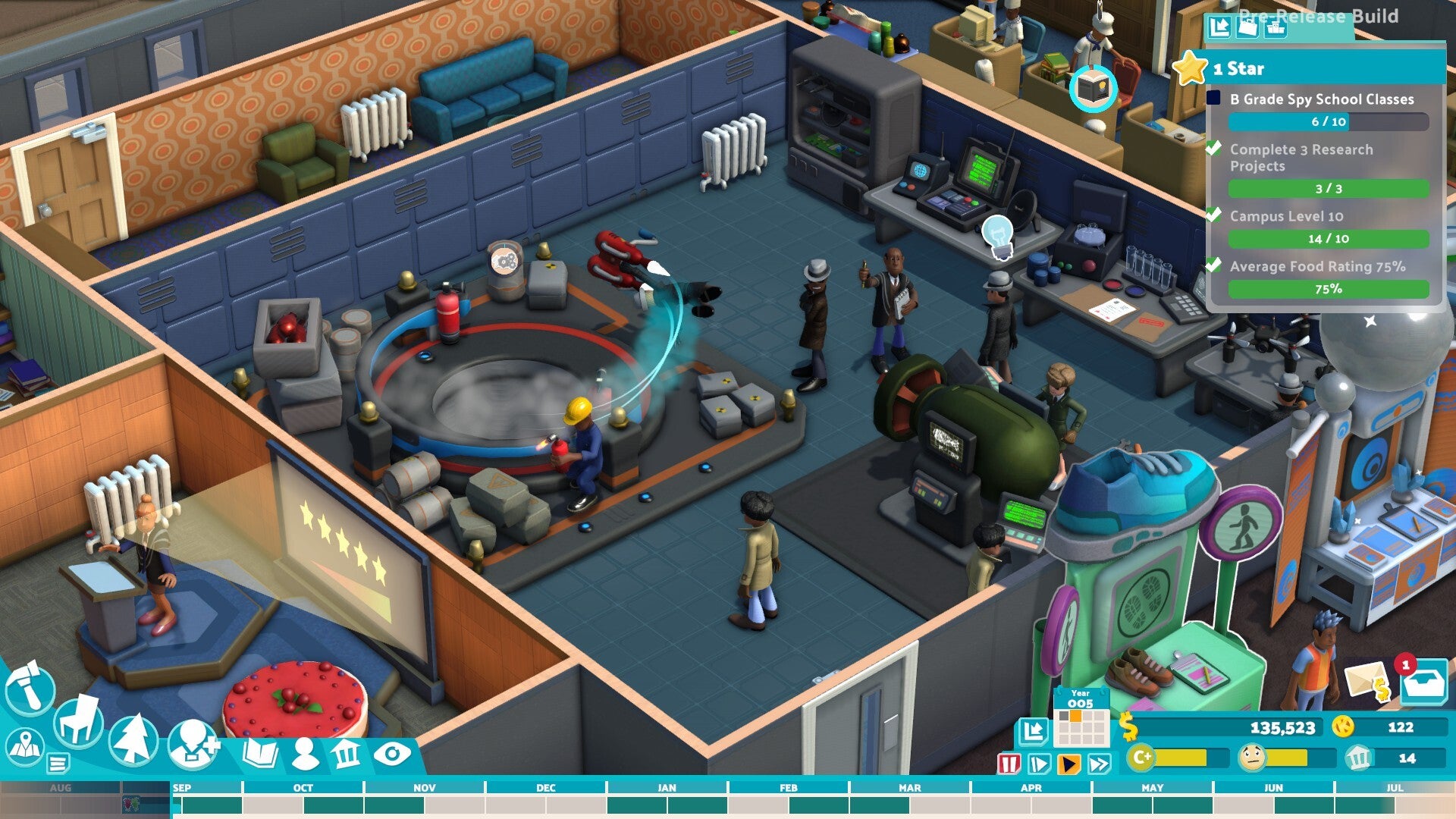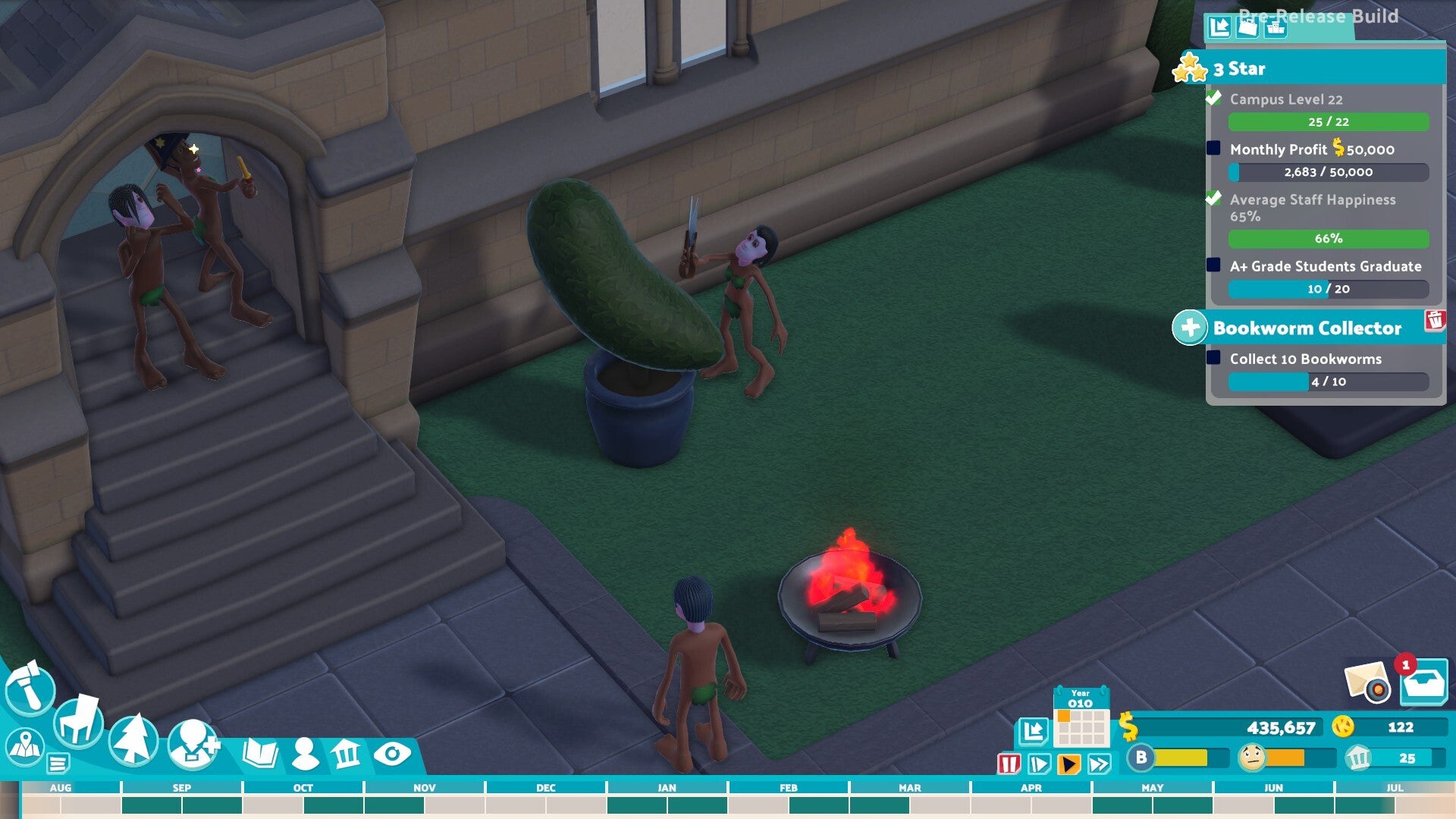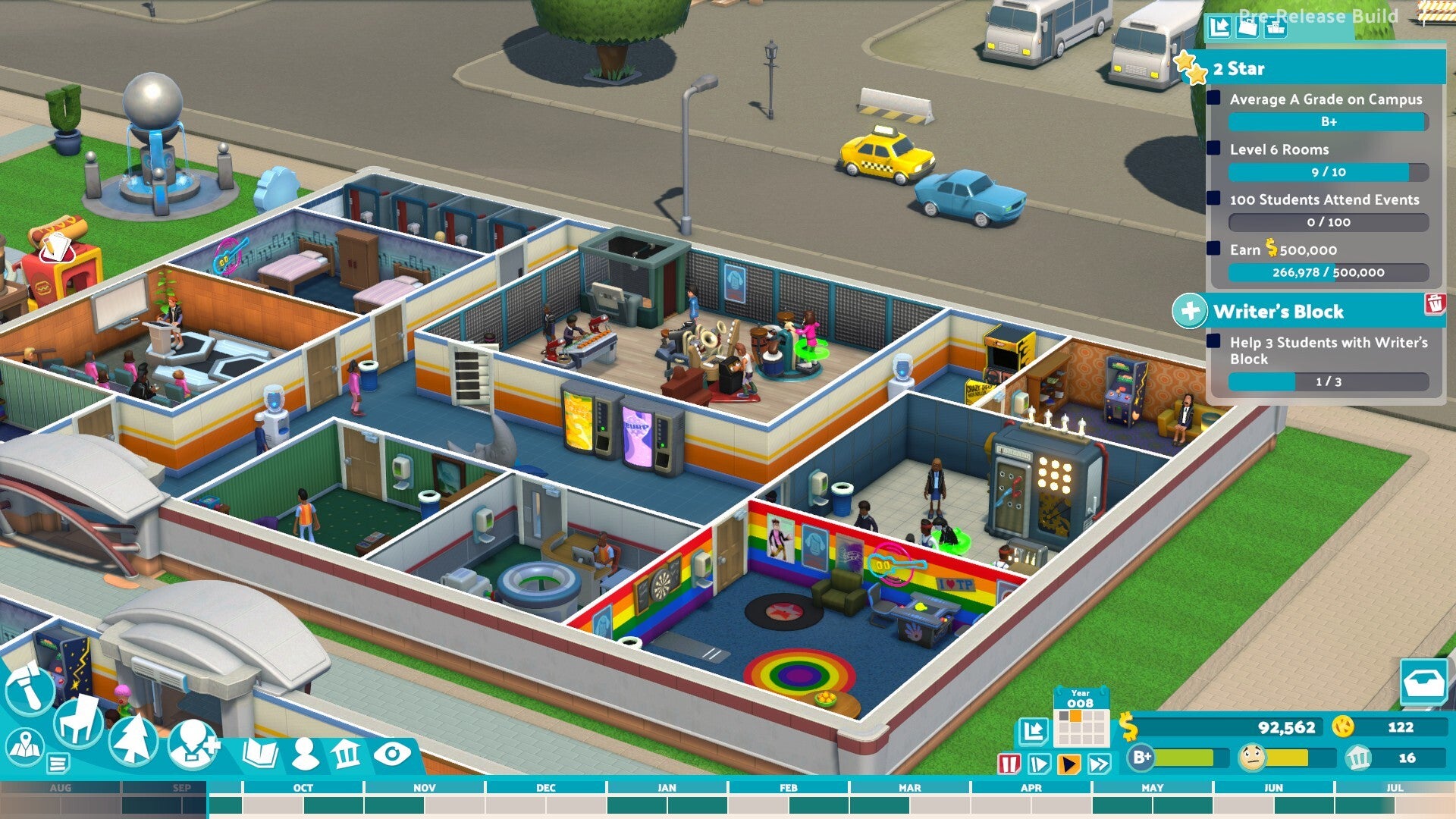Before that though, the basics. To those who’ve played spiritual predecessor Two Point Hospital, Two Point Campus will be very familiar. The two games are near-identical in their approach: take something typically mundane and make a game of it, adding a healthy dose of oddball British humour. The controls are reassuringly familiar, the art style bright, detailed and easily readable, and university life is accompanied by an appropriately 80s soundtrack for all the gossipy, John Hughes drama. The game’s campaign is essentially an extended tutorial, each new level providing fresh challenges to explain core mechanics and systems, and serving as preparation for the endless customisable sandbox mode. Each campus begins as a blank slate of buildings ready to be filled with lecture halls, classrooms, dormitories, bathrooms, private tuition rooms, libraries, and more. Staff need to be hired to teach, clean up, and keep students happy. Students have their own needs which pop up in the form of mission requests: I need a party! I need a bookcase to study! I need a love bench! (More on that later). The systems gradually layer up but never feel overwhelming, thanks to a lenient difficulty curve. The main challenge is balance: build too much and hire too many staff and you’ll quickly run out of money and be forced to take a pricey loan until more unwitting students join the chaos. That’s done by adding marketing rooms to attract new students, but has to be balanced with looking after the existing ones, who’ll need pastoral and medical care to make it to graduation. Then there’s balancing tuition with entertainment: between classes students can join various clubs to provide buffs to their learning or walking speed, while student unions can host pop concerts, and lecture halls can screen films. There’s endless enjoyment just in juggling the day-to-day - always a new room to build, students to help, teachers to train - but what really elevates Two Point Campus beyond a set of smartly interlinking systems is its charm. It’s there in the randomly generated names, the tannoy announcements that spout university clichés, the farcical animations of each student in class. Half the fun of the game is unlocking a new course to see what whacky classroom can be installed next and then just watching students in their silly costumes. The humour never gets tiresome and, somehow, it all combines to make you care about these tiny virtual people. That’s aided by the friendship and romance system, one of the game’s big new additions compared with Two Point Hospital - ideally university isn’t a quick in-and-out like a hospital visit, after all; students settle in for up to three years of study. Placing benches, water coolers and other items around campus spurs the little androgynous students into friendship; add in love benches, a romantic double bed, or a love trumpet (yes, you read correctly) and they’ll take that friendship to the next level. In reality, relationships don’t impact gameplay all that much beyond increasing the happiness of students, but they go a long way toward adding colour to each campus. I found myself creating storylines for students, following their lives over three years from innocent fresher to proud graduate - despite my mismanagement. On my gastronomy campus, for instance, between the giant pizzas, cakes and burgers, I inadvertently created a school of gay chefs. (Two Point Campus’ relationships are wonderfully inclusive.) Over on the sports campus of Fluffborough, it was really the story of star cheeseball player Isaac Stretchfore, who took a moment to dance on the pitch dressed as a mouse, before throwing a wheel of cheese in a beautifully curling shot to win the match against our rival school. Elsewhere gay jock soulmates Ace Tacklebag and Asquith Peppermint spent far too much time in the gym riding static bikes together. Each new campus has its own quirks, be it new ways of generating money or certain (un)natural disasters, providing a constant thread of twists to further challenge your management skills. On the archaeology campus, for instance, any discoveries you dig up can be sold for extra cash, but the hot climate meant students suffered from rampant body odour no matter how many showers I put in - relatable over this hot summer. Things also took a turn at Knight School. First, the school was invaded by rival sword bearers intent on wreaking havoc, though I quickly trained up my janitors in security to chase them down with water pistols. Then, students required medical attention for both Knight’s Knee (spending too much time on their knees) and Rusty Bulge for practising out in the rain (no sniggering in the back there). That meant building medical facilities in a cute nod to Two Point Hospital. Then there was Hogw- Spiffinmoore. When not invaded by “life munchers”, the campus suffered lightning strikes and meteor showers from an evil witch. Poor Reg Pungent the goth was left aggravated and needed extra pastoral care, while Imogen Lemon and Slayer Windchimes found friendship in the student lounge, sitting shyly on the sofa together as the storm raged outside. I’ve got no idea who let Nigella Fromage enrol, though. I particularly enjoyed this wizarding level as I explored the game’s customisation options - another area where Campus improves on Hospital and adds considerable depth. Kudosh earned from completing student requests can be spent to unlock various in-theme decorations for placing around campus, both inside and out. Here, that meant placing gothic bookcases, owl statues and candles along the hallways between potion and duelling classrooms, while broomsticks, rune stones and fire pits bordered exterior pathways. It’s possible to spend hours just tinkering away with decorations to create the perfect school, though I do wish kudosh could be earned a little quicker - too often I’d frivolously spent it on fancy decorations instead of things that mattered, like actual learning facilities. Eventually, I unlocked Upper Etching and its music course. My mission to create the ultimate music academy could finally start properly. After a post-party cleanup (typical), I filled the campus with all the usual requirements before adding a recording studio and installing some odd looking instruments - weirdly, the students also required a gym, despite me never once doing anything remotely sporty at university myself. The rooms were decorated with record rugs, neon guitar signs, popstar posters, and a Pride themed student lounge. By this point, between knowledge of Two Point Campus’ many interlocking systems and a wealth of customisation options, I truly felt I could build a lively school that reflected me. Once the students joined, it all kicked off. Fabio Volcano was found playing saxophone incessantly in the corridors; Rob Jazz danced through the dormitories, until he failed the year; Byron Grunt suffered after-shakes from too many…milkshakes (seems legit); Mick Eruption was a whizz on the punch and kick drum to score top marks; Hester Blancmange was a travesty at the open mic night (some in-house entertainment); and Honey Fingers and Wrenchy Peregrine couldn’t keep their hands off each other at the love bench. In fact, music campus ended up with a far higher rate of relationships than any other - musos are a horny lot, aren’t they? Was any of it true to life? Well it wasn’t always far off. In the world of Two Point, music tuition is given for free, which younger me would certainly have been jealous of - although I quickly ran out of money for new facilities and was unable to train up the next generation of popstars. But let’s not get into issues with the cost of UK education. Having already proved their skill at management sims with Two Point Hospital, Developer Two Point Studios has taken a step up with Two Point Campus. The systems are multiple, the customisation options deeper. But it’s the minute details and British jokes that bring this parody world to life. As the game’s tannoy announcements constantly note: “Students are reminded to find themselves.” Putting the jokes aside, Two Point’s latest truly captures that.

